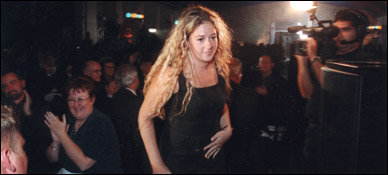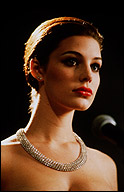kaleidoscope
Karen Devon: Determined to make a difference

Karen Devon on her way to picking up her Forces Avenir prize
Karen Devon's favourite book is The Color of Water by James McBride. It's the author's story of his mother, an orthodox Jewish woman, who hid her identity, married two African-American men and raised her 13 children, in relative poverty, to become exceptional adults. "I buy it for everyone," says the exuberant 23-year-old, her brown eyes gleaming intensely.
Her feelings for this book may stem, in part, from her own life. Devon has a Jewish -- though not orthodox -- mother and father who lost everything in World War II and had no opportunity for higher education.
While they were not poor, they were not rich immigrants either as they built their lives anew in North York, near Toronto. Her mother was a homemaker while her father worked as a pattern-layer for a clothing designer. Devon's parents were relatively old when she was born and they put "as much as possible" into their only daughter.
The result of that love and commitment is an exceptional person. Not just because she was one of two out-of-province students to be accepted into medical school this year. Not just because she is an accomplished pianist and a fine athlete -- a one-time member of the Varsity rugby team to boot. Not just because she has a long record of social involvement, including being the ombudsperson at the McGill Students' Society's Sexual Assault Centre. And not just because all these accomplishments led to Devon winning the recent Forces Avenir award for Quebec students who demonstrate leadership and social commitment.
Beyond that, what makes Devon exceptional is the insight she has into her own life, rare in one so young. She's wise beyond her years. She knows, for instance, from where her compassion -- it's what attracted her to medicine from the time she was a child -- comes.
"My inspiration is my parents. My father is a Holocaust survivor; that's where I get my compassion from," she says. And she appreciates just how much she owes her parents.
"I was always surrounded by older people and their stories of the Holocaust. For a 10-year-old girl, I knew way too much. I feel a lot of me came from them and the effort they put into me."
It was a milieu that gave Devon sensitivity to the suffering of others. "I was always sensitive to other peoples' problems and I knew that I wanted to do something to help others. In medicine, you also have the intellectual side. So, it seems like the right thing to do now."
But Devon hasn't been single-minded in her pursuit of medical school; hence her curious undergraduate combination of a major in anatomy and cell biology and a minor in women's studies. Her interest in women's issues began during first year, while she was in residence at Solin Hall. "I saw how body issues were so present in the women there. There were girls who would pour water rather than milk on their cereal in the morning!
"I was never entirely a science person. Arts gave me a broader way of thinking. Taking courses in women's studies taught me how to communicate," she says.
Her favourite undergraduate course was Feminist Legal Theory, taught by law professor Colleen Sheppard. "It was my worst mark and my favourite course. It made me think so hard."
Throughout her undergraduate program, Devon sought out exceptional peers and teachers. While a student representative in the Faculty of Science, she sat on committee meetings partly to make contact with professors. "People who have done things motivate me. Just to talk to [chemistry professor and science popularizer] David Harpp is very motivating."
Devon's special qualities have been noticed by her classmates. Members of her medical class, for instance, asked her to run for class president which she did and won -- despite her decision "to concentrate on coursework this year."
"The idea that she was selected president is an amazing feat considering the number of very mature people in the class, people with graduate degrees and so on," says Professor Louis Hermo from the Department of Anatomy and Cell Biology. Devon taught students in a lab component of one of Hermo's courses.
"One thing that excites me is that she'll be a great medical doctor," Hermo adds. "She's not just a brain, but has a good, kind heart."
 |
||||
|
Its time has come and gone. Its hearings have become a farcical beauty contest where the regulator imposes a tithe for content requirements and then doesn't enforce them. |
||||
Bracing for Stardom
 Jessica Paré
Jessica Paré |
|
Fathers have a reputation for being protective of their daughters. So what do you do if your attractive 19-year-old daughter is about to make a huge splash in an industry that isn't known for treating attractive young women very gently?
If you're Anthony Paré, you worry. But you trust in your daughter's common sense.
Paré is the chair of the Department of Educational Studies and his daughter, Jessica, is the star of Denys Arcand's new film Stardom, set to be released next week.
Stardom co-star Dan Ackroyd, a veteran of the entertainment industry, predicts big things for the budding starlet. "Jessica Paré is a huge, rising talent."
"Show business eats its young," Paré acknowledges. "The people who write about it are often nasty. The people working in it can be vicious with one another."
Still, he thinks Jessica will be all right. "She's been very down to earth about this from the get-go," Paré says of his offspring. "She's not overly impressed with stardom. She still lives in the same dinky little apartment."
Jessica is in demand. She filmed a movie with respected Quebec director Léa Pool and is starring in a TV miniseries based on the book Random Passage.
A former actor and director -- he taught drama at McGill and played King Lear in one production -- Paré might have passed on the acting bug to his daughter. "As a kid she used to come down to Moyse Hall and watch rehearsals."
If Jessica does hit the big time, Paré pledges that he won't be the sort of parent, like Drew Barrymore's mom, to auction off her baby clothes over the Internet. "But if she makes millions and wants to buy me a place in Malibu, I won't stand in her way."
 |
||||
|
I think the anger on the Palestinian street is deep, and it's substantial. They feel that the peace process hasn't been heading anywhere. The bulk of the West Bank is still under Israeli military occupation and life is difficult. |
||||
We're number one
 ILLUSTRATION: Tzigane
ILLUSTRATION: Tzigane |
|
According to the Observatoire des sciences et des technologies (OST), McGill's scientists and engineers are the most productive in the country in terms of publishing their research results.
The number-crunchers at the Montreal-based OST describe themselves as being "dedicated to monitoring trends in scientific research and analyzing outputs arising from investments in university research." Using figures from 1998, the OST recently ranked the research productivity of professors in the natural sciences, biomedical sciences and engineering, who work for Canadian universities.
In evaluating the average number of publications that each professor at the different institutions produces, McGill comes out first overall. McGill professors averaged 2.72 publications apiece. The University of Toronto finished second with 2.23 publications per professor. The University of Alberta was third with 2.1 publications for each professor.
The OST also analyzed the numbers to see which university's publications were the most influential -- that is, how often were publications cited by other researchers.
McGill fared very well on this indicator too, finishing second in the country to the University of Toronto. According to the OST, McGill and U of T were "the only two universities [to] have a significant score." Breaking down the overall score into individual disciplines, McGill professors finished first in clinical medicine, second in mathematics, and third in biomedical research and physics.
Finally, the OST looked at the universities' publications to determine which university professors collaborated most frequently with colleagues in other countries. Here the OST's conclusions might be a bit disappointing from our perspective.
McGill finishes seventh overall; 38.5 per cent of the University's publications involved international collaboration. Top spot might be a surprise; Carleton University leads the way with 51.6 per cent of its publications involving collaborators from other countries. Mind you, McGill professors do publish far more papers than their counterparts at Carleton.

